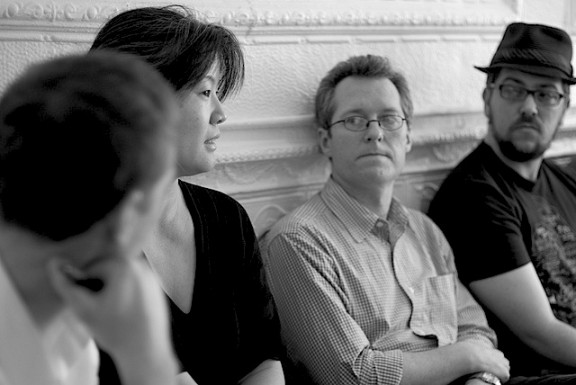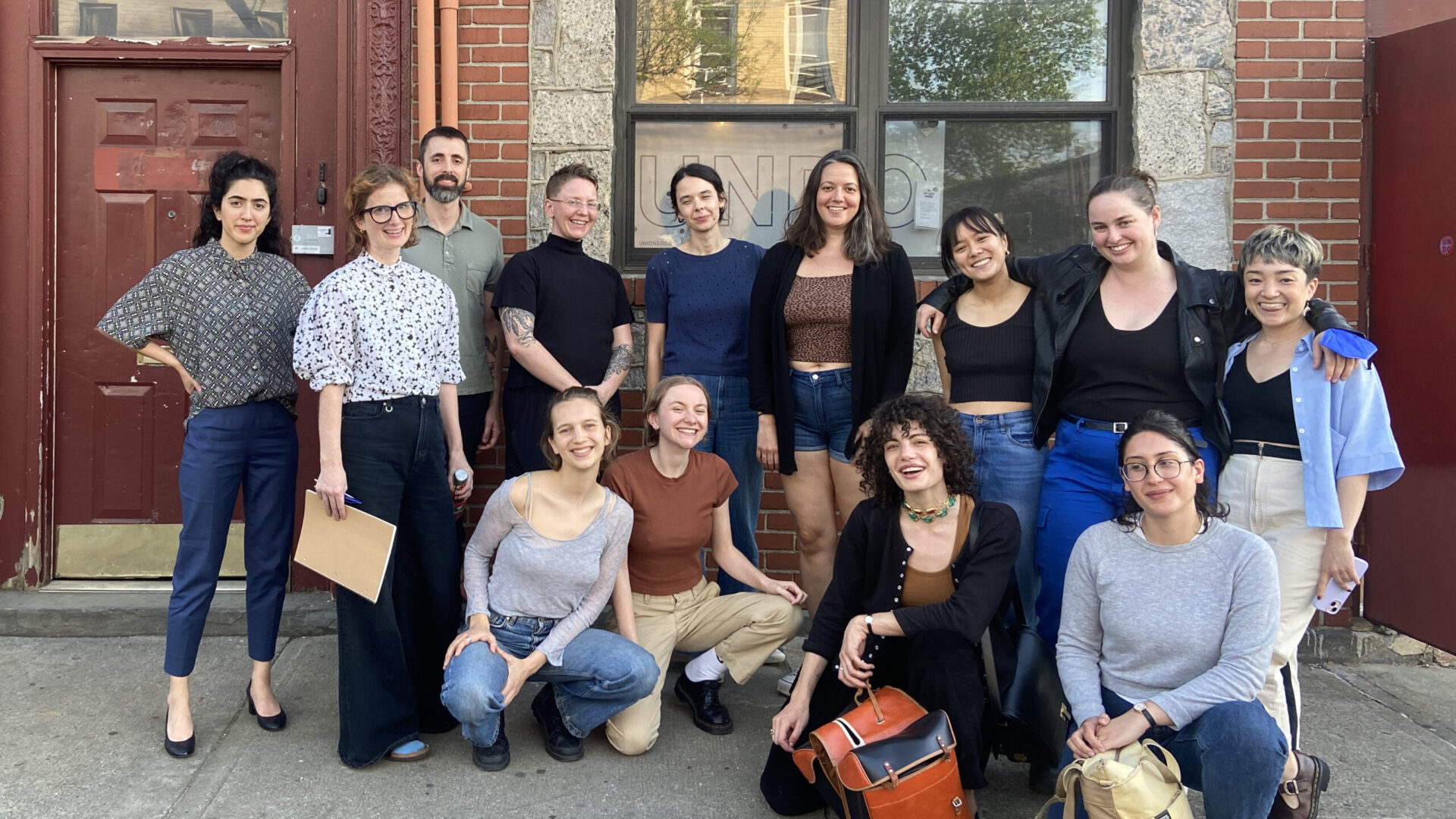Thom: I want to pick up on something that Ed said, which is that we lack an historical perspective on documentary sometimes, and then what documentary can do versus books or other media. One of the turning points of American documentary was around 1960 was when Robert Drew who was working for Time Life gathered together this group of people included D.A. Pennebaker, and Richard Leacock and Albert Maysles, and started making these observational films. And Drew had like a very clear vision of what he wanted to be doing with these films, and part of that vision… what he felt is that these hour-long documentaries that would be on TV would cause people to read a magazine article that would then cause them to read a book. He very much saw this work that they were putting out there in the world… he knew that what he could do well on TV was convey an experiential sense of what we’re talking to. What he really disliked about what television was doing at that time was trying to replicate radio or books by just having Ed Murrow talk to you as if you could turn off the picture and it would be the same as if you just listened to it. But if you turned down the sound and just watched it, it would make no sense. He wanted to make films where there was much more picture telling going on. But he never thought that it would be a replacement for reading books.
Today, there is a kind of thread that, if you read a lot of documentary criticism, where you’ll see documentaries kind of get knocked for: well, it didn’t contain enough information. Or, it only told one side of the story. Something that comes up about Iraq documentaries, is that, Well, it’s only the soldier’s perspective. It’s only the general’s perspective. I think it’s an unfair criticism. You don’t just watch one film to understand Iraq, you watch dozens of films and read some books and articles. You don’t watch just one film to understand the Barnes Foundation. If you’re interested in that subject, you have a menu of things to take into account.
Richard: I think it comes with the territory to a certain extent, because if you’re a filmmaker who is motivated to make a documentary, usually you’re not coming to an issue with a sense of neutrality. You’re attracted to the subject because you’re passionate about, not the subject as a whole, but about one side or another. Every now and then it happens that in the process of doing your research you find that there are perspectives you were unaware of in the first place. But I agree that this is an endemic problem in documentary. But it tends to be a medium for the motivated, so to speak.
Colin: So returning to the question of specialization –pretending that it’s economically feasible, what would it do that more general film criticism doesn’t? What sort of questions would it get at that we’re not seeing now, and who would the audience be? Who would read it?
Thom: Richard said something earlier about the de-professionalization of film criticism. That wasn’t the word he used, but that’s the word I’ve introduced. But, we would all love for film critics to be well paid in their positions, but it doesn’t always happen. I think it is a place ripe for volunteerism. I was an editor of a magazine called the Comics Journal, it’s been published for thirty plus years, and that was a magazine of news and criticism about comics, and was a big part of championing work like Love and Rockets and Dan Clowes. And also taking issue with other careers. The writers for the Comics Journal, they all had other jobs. They were, you know, sometimes they didn’t write for anything else. They might be postmen, but they cared deeply about this, and they did their own schooling in the subject matter. You weren’t university educated in the history of comics. And yet, you got incredibly vital writing and still do in the Comics Journal that was very meaningful to the development of that art form, and that was just fun to read. When that magazine came once a month, I grabbed it because I wanted to see these debates taking place that happened with a kind of zeal that I rarely get from film publications.
Ed: It is an interesting point because a lot of documentaries, the academic markets have historically been very important. It can’t really be discounted how much—it’s perhaps one of the rare instances how much an academic reputation of a film can actually have a real economic impact. Because it continues to be a relatively important market for documentaries. A lot of filmmakers get asked—
??: For a career like Robert Gardener—
Ed: Exactly, he had an institute at Harvard that he ran for many years. He used academia as a way to help make his movies. I think it’s interesting. It does make me think, because I’m actually teaching a class on the history of documentary at Bard, and it has made me look at academic writing which I normally don’t. I teach but I’m not part of the academic world. But it’s made me try to look at the academic writing and there is some interesting work. There’s a book that gets used, I don’t know if anyone ever read it, by Bill Nichols called Introduction to Documentary that gets used in a lot of classes. It’s very academic, but at the same time it’s a very valuable book and it makes you think a lot about questions of form. I think it’s there but it might be invisible to a lot of us, because if you’re not taking a class right now, if you’re not in school right now, it’s not the kind of work that travels outside the system that well…Karin, is there an academic market that’s significant to the work you’re distributing?

Karin: It’s the only market. It’s the only market right now, honestly. When I saw these films—we’ve all been talking about it, but the theatrical market is a loss leader in our industry, whether its narrative or documentary, and it’s only shrunk in the last three to five years. I’m not gonna look at a three-hour long observational documentary about a village in China and think that this has to be in the theatres. What’s ironic is that that documentary ended up in the theatres because of film critics. Honestly, it launched—you know, that film’s on a semi-theatrical run around the US right now. It’s incredible to me and it’s fabulous.
Steve: How did criticism get it started exactly?
Karin: I mean, literally I went to see a documentary at Rooftop Films and I ran into Dennis Lim, who you guys all know, he’s a great film critic and now he works at the Museum of the Moving Image. I started talking about this film that I saw, turned down by every festival that the producer applied to. I just offered to help the producer. I said, ‘You know what, it’s a good film, don’t send it to X Festival. Let me try and find a home for you in the States.’ I saw Dennis and I was like, ‘Dennis where do you think I should apply?’
He was like, ‘Why don’t you submit it to me?’
I said, ‘Well, what do you mean?’
He was like, ‘Well, I’m programming now for the NY Film Festival.’
I said, ‘Ok.’ I called the filmmaker in China, and I said please, I don’t know how, but get a DVD to me. It arrived the second to last day of their programming. Dennis really fought for it, put it in the festival. And the New York Times had wanted to write a story about our films for like six months. When I told them that this film was in the NY Film Festival that was the hook. They were like, Ok. They flew to China, hung out with the whole underground film scene, wrote a really incredible feature on this film. That film just exploded on the critical scene. The editor of Time Out emailed us and was like, you know, I could kiss you guys for putting this film out. So it’s been a really great critical response. The criticism that’s been published around that film after it played again at MOMA last month really sparked this theatrical run of it. Facets, the guy who programs Facets, Charles Kohlman read the review and called us up and said, Let me put this film in my theatre. So, you know, now it’s still playing. It’s on the West coast now. It’s ironic because I looked at that film and I was like, Who’s gonna put it in the theatre? Who’s gonna go watch this film? It really was due to a film critic and supported by film criticism that this film has gotten out there. That’s played a huge role.
But that film was an exception. Most of our films go to the academic market. It’s the only market that exists. There’s really serious, interesting scholarship and debate around these films on the university level. For now, that’s where we’re finding the audience. Our goal as a company is to build that audience into home video and into more of a consumer base. But it all has to start with the criticism, whether it’s journalist critics or academic critics.
Lisa Buy : I actually just wanted to say that I honestly, genuinely feel like I’ve learned a lot during this conversation today because… I was really surprised, I sort of figured, and I’m probably right, that it was mostly because I’m a woman that I was asked to be on the panel. I mean, I don’t write about docs that much. I was worried about what I would say. I’ve been really honest about what I would say. As a critic, I never know what to do with documentaries when they cross my path and I need to review them. I think that documentaries can start being looked at not necessarily through the lens anymore of: the ultimate achievement of a doc is that it lands in a movie theatre.
Because even while we started to back and forth about it, Well, most people aren’t gonna see it. Well, they can watch it through Netflix. That was ultimately the counter-argument I just got. The idea is that if we start to think that documentaries aren’t necessarily movies, and if we start to look at not only who’s going to watch them, but how are people going to watch them. I think it’s an interesting set of questions. It’s liberating when you consider writing about them, too. If you’re not writing about them only from the auspices of: I’m judging them as a film, then it gets a little bit easier. It’s true that you’re responsible for the 90 minutes you’re taking from somebody. But there’s a lot of different ways that we watch, and we all know it.
Richard: But that brings up a paradox that the new paradigm for watching movies that you describe, which is exactly right of course, meaning that people are watching a DVD, or watching streaming video by computer, or watching on video on demand. Look at a movie like—it’s as much the case for documentary as it is for some of the most formally impressive, visually sophisticated, fictionally alive, or emotionally alive fictions in the independent world that are out there. So take a movie like Daddy Long Legs, which has already done a round on the video on demand, and is now going to get a theatrical release I think next Friday. Far more people have and will see this movie which merits viewing on the big screen than will ever get to see it on the big screen.
So, it’s a double issue. On the one hand, we’re looking for an excuse to talk about films in an extra-cinematic way because they’re journalistic documentaries and we don’t hold them to the same aesthetic standards. On the other hand, the films that do merit consideration as aesthetic works of the highest degree are being seen on the same playing field.
Lisa: Right. A different problem.






This is a great document of a great discussion & I want to thank UnionDocs for sharing it.
Pingback: Underground Film Links: May 22, 2011 | Bad Lit